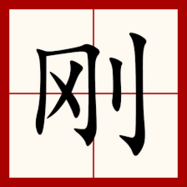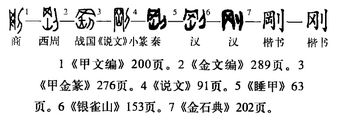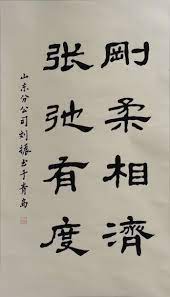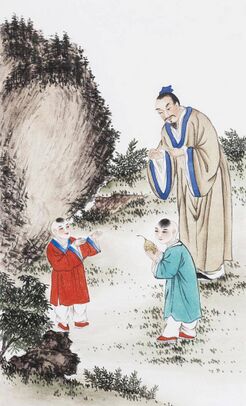Course:ASIA319/2022/刚(gank)
Introduction

Gang(刚)is a term initially used to describe the desirable quality of being strong-willed and independent. Nowadays, there are a wide range of variants of the meaning of the word Gang(刚) in different linguistic contexts. The meaning of Gang (刚) has gone beyond the sole message of being strong and tenacious. For example, it is also used to describe the situation in which two parties are confronting in competitive games. In the current internet environment, the word Gang (刚) is observed to be mentioned frequently, and therefore getting to know the comprehensive usage of this term can allow us to uncover what the popular culture is in China nowadays and identify the social ideologies of people from all socio-economic background. In this wiki page, I am going to illustrate various formations of the word Gang (刚),and clarify their exact meaning and usages, which will contribute to the better understanding of linguistic diversity and the impact of the internet interaction on the language usage.
The genesis of the keyword
The word Gang (刚) firstly emerged as a phonogram inscribed on bones or tortoises shells in Shang dynasty. It was initially referred to quality of being solid, and then extended to mean that someone is strong-minded and honest. Besides this, Gang (刚) is also used to show someone is unwilling to adopt advice from friends. Below is an excerpt of the prose from the renowned book韩非子.十过
鲍叔牙为人,刚愎而上悍 Bao ShuYa is rejected to advice from others , and is fierce to the higher-up
More recently, Gang(刚) is used in the online game context in a slightly different way. When people participate in the online competitive game, they often use the word “gank”,to mean catch antagonist. As more and more people are attracted to online games, the word Gang(刚) becomes even more popular on the internet. Compared with some popular vulgarized words and phrases, the meaning of the word Gang(刚)is quite positive, which makes it even more popular. For example, people use the slogan “ if you are real man, Gang(刚)是男人就正面刚” to express the wishes credited with men. In other words, gang has a more positive association than other popular words on the internet have. The appearance of the word 刚 in games supposedly started from the word 杠(gang), which means to challenge. These two words have very similar pronunciations, and 杠 eventually became 刚 in gaming communications and strategies.
Glossary of its explicit dictionary meanings
Dictionary Meaning of 刚
The word strong, or written as刚(pronounced as gang) using Chinese characters, can be used to describe something concrete like synthesis metal, or to refer to the human characteristics of being firm, strong, upright and outspoken. It can further be used as an adverb, which means only, just now, barely, and as soon as.
Etymology of 刚
Chinese characters (漢字, pronounced "hanzi") are one of the earliest writing systems to appear in the world. it is reported to date back to as early as five thousand years ago when they were written in the form of pictograms. Since then, traditional Chinese characters have developed over the last few millennium, adopting many different scripts and styles. Gang originally emerged in the form of seal script (篆書), which was adopted from the Zhou Dynasty script. The structure of gang consists of two parts: the left side resembles a knife sheet, and the right side means knife in Chinese morphology. Therefore, the translation of Gang can be considered as something as strong as a knife.

An elaboration of its variegated meanings, actual usages, and value-loaded implications
刚 in Chinese Popular Culture: Multiple Meanings and Usages
Usage in online discussion forums, media, and the popular press
Apart from the meaning used to describe the quality of being strong and upright, the word 刚 also has other implications in the context of internet. For example, 刚 is frequently used to describe the quality of being fearless and rebellious, even in the face of someone who is more superior in the social sense. The adoption of this new context and implicit meaning is typically seen in online discussion forums about different kinds of relationship. For example, an employee may ask netizens about whether they can “刚” their employers in organizations, which means if they can express their ideas frankly when facing managers. Also, same questions about the meaning of 刚 exist among lovers and friends, young woman may pose questions in the online forums like “why did my boyfriend say I am 刚?”
Associated words
Ying gang(硬刚)
Although both characters mean strong, they have slight distinction. Ying(硬)is used to describe the situation where something has to be done compulsorily. Gang(刚) means confronting something proactively. This synthesis phrase means the situation in which when people face problems, they will confront it bravely no matter how difficult problems are. This phrase is used widely on the internet, we can find the phrase in gaming culture, in celebrity drama and online arguments. The most recent popular usage of 硬刚 is used in office politics. "超半数年轻人正面硬刚,00后「整顿职场」", meaning more than half of the younger generation is confronting problems in office bravely, people born after the 2000s are rectifying the workplace.

Wo gang ni (我刚你)
Wogangni(我刚你)is an oral expression and means that I will support you. In this associated word, 刚 means to support and back up. Hence, we can have other expression using the word 刚. For example, wogangta(我刚他) can be used to mean that I will support him. This is a colloquially expression most commonly used in Northern China.
Gang ge(刚哥)
Ge(哥)means brother, and the associated word gangge(刚哥)means someone who has strong wills and is prepared to meet any challenges in life with positive attitude. gangge(刚哥) is a popular usage in online discussion forums. For example, the 22 years old famous Chinese celebrity 王源 wants his fans to call him 刚哥 because he wants to get rid of the public's impression of him still being a cute kid. 刚哥 implies that he is manly and mature, which is contrary from how the fans see him

Gang qiang(刚枪)
The term gang qiang(刚枪) is used in the online game context most frequently. When people play online competitive game, especially shooting game, they often use this term to describe the scene where gamers shoot each other face to face , without any shelters. For example, in the Chinese game 刺激战场,which is the mobile version of PUBG, there is a title named 刚枪王. To achieve the title of 刚枪王, players must kill at least 8-12 opponents in one single game. This is a representation of a player's shooting and aiming skills in the game.

Counterpart terms
In Chinese, gang(刚)is used to describe the state of being firm and the quality of being upright and brave. Similarly, terms in English are also used in the same way. In English, strong is mostly used to describe the nature of material which is resilient, and firm. But it is also used to describe the characteristic of being ardent and firm. Also, in Japanese, the term 固い is used to describe something which is strong and not easily deformed. But it is also used to describe the characteristic of someone being tough and indomitable
Meanings in context
Across almost every context, gang(刚)is a desirable quality, either used to describe objects or individual people. Gang(刚)means strong, firm and upright. In the online discussion forum, gang(刚)is frequently mentioned with positive association. When people use this term, they often want to convey the message of being brave and upright.
Transference of 刚 to other context
An interesting phenomenon is that sometimes gang(刚)is used to describe someone who is ignorant and takes no notice of what he or she should be supposed to know. Hence, sometimes, gang is a verb used in the context when someone deals with challenges in an oblivious and arrogant manner.
Social, cultural, and political problems
The most culturally loaded usage of the term “刚” is in the idiom “刚柔并济” (gāng róu bìng jì), meaning strength and subtlety combined.[1] First introduced as a Taoist principle, people still use it in contemporary times in a variety of different contexts—for example, in the context of gender expression. “刚” and “柔”, strength and subtlety, are associated with masculinity and femininity respectively, similarly to the concepts of yang and yin. The proverb can be applied to diverse contexts, from philosophy and martial arts to appearance and art.[2] Even so, it is not considered common in daily usage, as the word “刚” is not commonly used besides in general phrases like “剛好” (just enough), “剛剛” (just happened), etc.

The verb form of the term, which means something along the lines of “to fight”, has also gained popularity in certain contexts specific to modern pop culture. In combat-oriented video games like League of Legends, as well as colloquial situations in the real world, the term is used to indicate direct conflict regarded as a somewhat frivolous sense. This usage of the term is mostly considered slang, contrasting it with the adjective definition, which is rarely used in colloquial contexts. In both cases, however, there is a connection with power and aggression. For example, in some commentary about League of Legends players, someone states “不是最强也是最刚”,[3] meaning “even if it’s not the strongest, it’s still the toughest”, highlighting a difference in the nuanced meaning between the usual definition of strength and the specific meaning of “刚”. As mentioned above, “刚” represents not only a general sense of strength but also an idea of rigidity, honour, and toughness associated with traditionally masculine values.
The aforementioned idiom has been used as early as Romance of the Three Kingdoms and 为刘荆州与袁尚书 (“For Liu Jingzhou and Yuan Shang”).[1] Surprisingly few academic sources make use of the term in general (not counting general phrases like “剛好”, “剛剛”, etc.), likely because of how it is mostly use in a proverbial or informal context.
The duality of yin and yang and of femininity and masculinity has been part of China’s cultural consciousness for centuries, and the concept is generally understood not to be two diametric opposites but rather two parts of a whole that require the other for balance.[4] As philosophers observed yin and yang in not only human nature but all parts of life, it is unsurprising that the balance of strength and subtlety would be applicable to many circumstances.

This type of thinking–that balance is more important than any individual trait–is not wholly unique to Chinese philosophy, although it has gained the most traction there. For example, the concept of the Golden Mean posited by Aristotle states that anything in excess or deficiency cannot be a virtue.[5] He would likely agree to the idea of combining strength and subtlety: too much strength and too little subtlety leads to damage and an inability to do anything nuanced, while too little strength and too much subtlety leads to a lack of assertiveness or direction.
However, there are still issues with this form of thinking, as even with the emphasis on balance between the two, there is often a bias between one. For example, misogyny and extremism still exist in Chinese and Greek society even among those who supposedly adhere to these philosophies, since it is possible to interpret the value of different aspects of them subjectively. It is noteworthy that, when viewed in a vacuum, the concept of “剛” would be considered neutral at best due to its associations with violence and inflexibility, yet its use in society is generally unambiguously positive. Even in the contexts in which it signifies combat, it is typically used as a declarative action from the speaker instead of a criticism of the violence.
The lack of recognition of colloquial language in an academic context is an issue in every language, Chinese included. Although this term is frequently used in video games as stated above, there is little coverage of its meaning. Similarly, the medium of video games is also frequently denigrated as a “lower” media form and ignored in the academic sphere. The developing usage of “剛” in the context of contractual violence has not been explored yet, and the same could be said about the negligence of opposing concepts more associated with subtlety and femininity.
Conclusion
The concept of balance between virtues matches parallel philosophies in other cultures, for example Aristotle’s belief of the Golden Mean. In an era where opinions are frequently radicalized and polarized, the wisdom of balance may be more relevant for lasting societal stability than ever before. The popularity of the term in the informal sense could also warrant an investigation into why people are gravitating to that side of the balance. Although gender roles and the view on “masculine” and “feminine” traits have changed significantly from the era in which the proverb was invented to contemporary times, the proactive strength associated with “剛” has been consistently valued higher than any of its antonyms. This phenomenon could contribute to addressing the gendered distribution of valued traits in modern society.
References
- ↑ 1.0 1.1 bai, du (2022-02-18). "刚柔并济".
- ↑ 成语大全 (2022-06-22). "成语大全-刚柔并济".
- ↑ 提莫就不死-teemo just don't die (2017-10-28). "MLXG:对不起- sorry MLXG".
- ↑ Shen and D’Ambrosio, Lijuan and Paul. "Gender in Chinese Philosophy".
- ↑ Kraut, Richard (2001-05-01). "Aristotle's Ethics".
https://36kr.com/p/1996984848642817
https://k.sina.cn/article_6791522446_194ce688e00100junm.html
https://weibo.com/p/100808142b8e77eba030b576cc83b6983fa064/super_index#_loginLayer_1668279777349
Strong Definition & Meaning- Merriam- Webster. Retrieved from https://www.merriam-webster.com/dictionary/strong
刚哥这个词要如何理解. Retrieved from https://m.idongde.com/c/049Ab6691E5a5134.shtml
刚是什么意思什么梗. Retrieved from http://www.guangyuanol.cn/news/baike/2019/0920/994259.html
网络用语刚是什么意思. Retrieved from https://www.66152.com/answer/202103/48645.html
刚-字源查询. Retrieved from http://qiyuan.chaziwang.com/etymology-4269.html
Wang, Y. (2020). Introduction to Chinese characters. Retrieved from https://www.brown.edu/about/administration/international-affairs/year-of-china/language-and-cultural-resources/introduction-chinese-characters/introduction-chinese-characters
| This resource was created by Course:ASIA319. |
